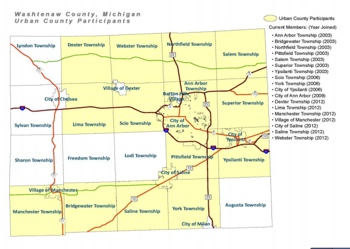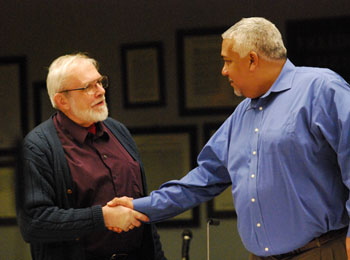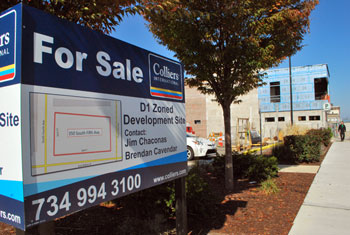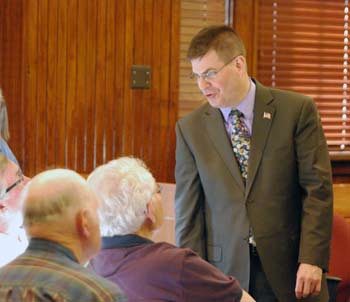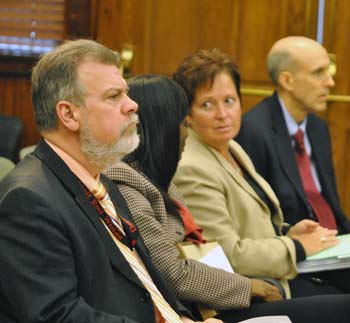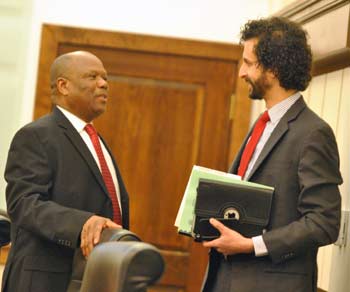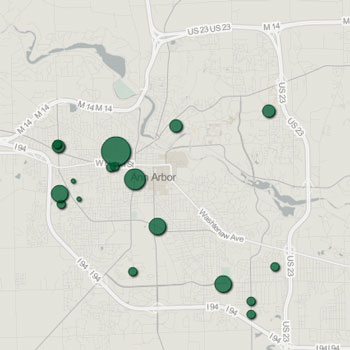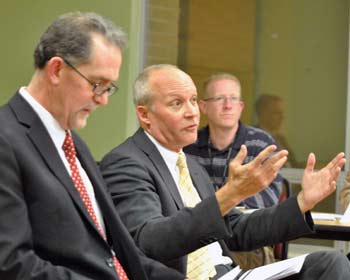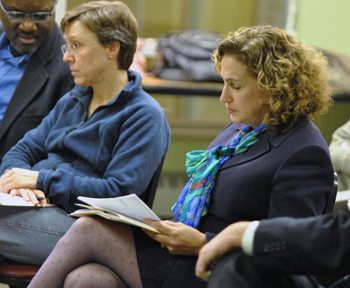AAATA Gears Up for More Accessible Service
Ann Arbor Area Transportation Authority board meeting (July 24, 2014): The board’s meeting this month was the next-to-last one before the initial expansion of services that the transit authority will be implementing. The expansion results from the new millage that was approved in a voter referendum held on May 6, 2014. The rollout of additional service is scheduled for Aug. 24, while the board’s next meeting is three days before that.
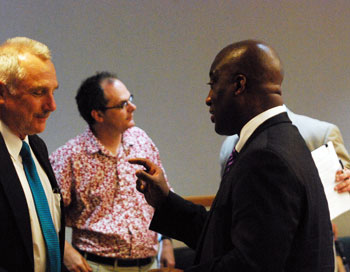
From left: AAATA strategic planner Michael Benham, Ed Vielmetti (background) and CEO Michael Ford, talked after the meeting.
The board barely achieved a quorum – with six of 10 board members attending. Anya Dale presided over the meeting in the absence of board chair Charles Griffith.
The board received some updates on the preparations for implementing that expanded service plan. And three of the board’s July 24 voting items were related at least indirectly to the additional services: a plan for acquiring 20 new buses; adjustments to the current fiscal year’s operating budget; and a tweak to the AAATA’s mission statement.
The mission statement was modified to highlight “accessible” as the kind of transit services that the AAATA aspires to provide. The change to the mission statement also reflected the addition last year of the word “area” to the name of the organization. That name change came as the result of adding the city of Ypsilanti as well as Ypsilanti Township as members of the authority. Previously, the city of Ann Arbor had been the sole member. The additional services will be paid for with a millage levied on property owners from all the member jurisdictions.
The fiscal 2014 budget ends Sept. 30. Revenues were adjusted to reflect the millage revenue. Of the additional $4,543,695 in local millage revenues, $3,850,000 is being put toward next year’s FY 2015 budget. Adjustments to this year’s budget include changes to reflect the hiring and training of 11 new bus drivers, bringing the total to 138 drivers. An operations supervisor, two new vehicle mechanics, an additional service crew member, and a human resources administrative assistant will also be added.
The additional 20 buses the AAATA is acquiring for the service expansion are spread over the next three years, with two to be acquired this year, 11 in FY 2015 and 7 in FY 2016. The buses for FY 2015 and 2016 will be paid for with the additional local millage funds, while the buses this year will tap a federal grant with matching state funds. A public hearing was held on the federal grant application that will include those two buses.
Potential future expansion of services – in addition to those to be implemented starting Aug. 24 – was also reflected in a voting item on the board’s July 24 agenda. The board approved an increase in the contract with SmithGroupJJR from $105,200 to $800,000 – to continue study of north-south commuter rail options between Howell and Ann Arbor. An earlier phase of the study for the WALLY (Washtenaw and Livingston Railway) project identified a segment of the Ann Arbor Railroad right-of-way, between Liberty and Washington streets, as a preferred location for a downtown Ann Arbor station. A portion of the work is being paid for with a $640,000 federal Transportation, Community and System Preservation (TCSP) program grant.
The final voting item on the board’s agenda was a $234,360 contract with GZA GeoEnvironmental to perform environmental cleanup work at the AAATA headquarters building at 2700 S. Industrial Highway. The cleanup, which involves contamination from a gasoline leak that was identified in 2010, is covered by insurance.
At its July 24 meeting, the board also heard its usual range of updates, reports and public commentary, much of which highlighted the idea of accessibility. [Full Story]




